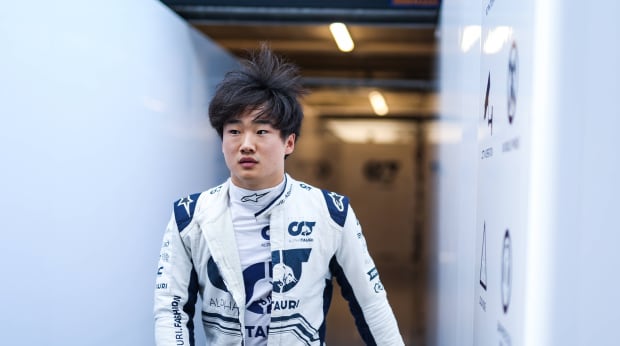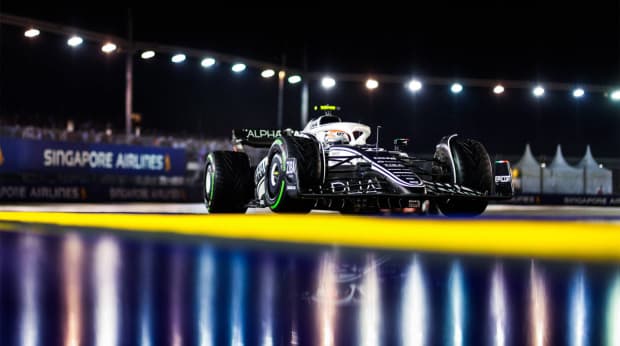Sunday’s grand prix marks the first time Yuki Tsunoda will be competing in the pinnacle of motorsports at home as Formula One returns to Japan for the first time since 2019.
Suzuka, located just over four hours from where Tsunoda was born, is where the 22-year-old’s journey to F1 began. He made his debut during that round of the Japanese F4 championship in 2016 and went on to win the title in ’18. That landed him a spot on the Red Bull Junior Team, and the Honda Formula Dream Project the following year in Formula Three. By 2021, Tsunoda found himself on the F1 grid alongside Pierre Gasly on AlphaTauri.
Now, his face is plastered all over posters surrounding the track as fans welcome him home. He said during Thursday’s press conference, “It’s very cool. Currently I don’t feel like getting pressure because it’s really hard imagine I’m driving here...Just four years ago I was one of the spectators watching these guys, you know? And now I’m driving in front of them, Japanese fans.”
It’s been a long road for Tsunoda to reach this moment as he has faced scrutiny, particularly this season. He only has 11 points to his name—all within the first six races. In the second-half of the season, he hit a rough patch as he recorded four DNFs, one because of a differential. Tsunoda most recently wrecked during the Singapore Grand Prix, something he accepted blame for and didn’t give excuses.
Although it’s a quick turnaround, Tsunoda reoriented himself as he returned to a track he’s all too familiar with, even doing a karaoke night with Gasly to welcome the festivities. Tsunoda has realized part of the balance of being a Formula One driver is also what one does outside of racing, finding ways to be physically and mentally healthy.
The last time Tsunoda was at this track, he won. Could his growth, the familiarity of racing in Japan and knowing he has a F1 seat in 2023 help him right the ship as AlphaTauri chases its goal of seventh place in the constructors standings?
As F1 heads back to the Land of the Rising Sun, Sports Illustrated spoke with the AlphaTauri driver about competing at home, the mental side of the sport and his standout signing performance with Gasly.

PanoramiC/IMAGO
Fuel for Thought is Sports Illustrated’s exclusive Q&A with Formula One’s biggest names. The following questions and answers have been edited for brevity and clarity.
Sports Illustrated: How does it feel being back home?
Yuki Tsunoda: It feels really good. I will say the food is amazing. [It’s] one of the things I was really looking forward to when I come back to Japan. I would say Italy helps a lot in terms of food-wise because, for me, food is [one of the] really important things in my life, especially the kind of foods to make my stress-level or mental-level consistent. If I have good food, a good lunch or dinner, when I have a bad day, that will reduce the kind of stress level and always makes me happy. Coming back to Japan especially after Singapore, what happened Sunday, I was really kind of stressing. As soon as I arrived to Japan and had a nice dinner, I was able to kind of reset my mind and face Suzuka.
SI: What is your favorite meal when you come back home?
YK: It’s called Motsunabe. It’s kind of like a soy sauce soup with a lot of vegetables and offal.
SI: How do you reorient yourself? Because I’m sure it’s hard to deal not only with the fame that comes with being in F1 but the mental aspect that goes into the sport.
YK: I think mental thing is a big one, especially only not just about the racing but also like on social media. Lots of pressures each race because each team spends a lot of money, and there’s a lot of people working for just two people. In our team, we have more than 600 people working for just two people. We always want to perform well as much as possible, especially points. I know that amount of effort the team put in the sport is huge, and that’s why we always feel more responsible. Especially in qualifying—one lap decides it. You make a mistake one lap, you might go into P16. Or even if you have the pace and be P4 or P5, you have one mistake and you’ll be P16. It’s kind of a mental sport as well. You want to be healthy as much as possible and relax as much as possible outside of racing.

PanoramiC/IMAGO
SI: Looking ahead to the Japanese Grand Prix, what should fans be watching for? What part of the track is the most challenging and why?
YK: I will say Suzuka is one of the tracks that they should watch from the outside. When I was a spectators years ago, I will say I was surprised when I watched outside of the track. For example, outside of summertime, when I watch Formula One racing outside of the track, for example offseason testing in Barcelona, of course Formula One is fast, but I didn’t get as impressed as I did in Suzuka. Especially in Formula One, turning into Turn 1, for example, with lots of sparkling is insane, and the amount of speed they carry into the corner…The right hander, it’s super fast. Most of the corners [are] high speed and super narrow as well so that makes [it] extra challenging
SI: A simple but deep question—who is Yuki?
YK: Big passion for racing and at the same time with food. I will say kind of a shouty guy, especially on the radio. Big difference person when I’m in the car than outside of the car. Really good at karaoke. I like gaming, and I’m super nice.
SI: I did see the video Pierre posted of you all doing karaoke. How did you land on that song?
YK: Hello is a really difficult to song, and we were at the end of the karaoke session so kind of finale. I think that the quality of this our singing deserves the finale song, and I will say I’d rate that a three out of 10. It wasn’t good at all, but at least I enjoyed it so much with Pierre. One of the highlights between us so it was really fun.
View the original article to see embedded media.
SI: How would you kind of describe the dynamic between you and Pierre because it’s one thing to be teammates, but it seems like, at least from the outside, y’all are good friends, also.
YK: With Pierre, it’s a really good relationship. Inside of racing, I can learn a lot of things from him and one of the reasons I [was] able to progress quite well from things from last year. Of course, he doesn’t give me advice directly because we’re competing together. But, he always been a kind of good reference driver, how to not just drive [but] how to act outside of racing and how they should prepare. Last year, I was kind of a lazy person. In offseason, I was not prepared much physical as much as Pierre, also compared to now. I struggled a lot of races in terms of physical condition… He was always in good shape. He always score points as consistent. So those those things I learned from him, and even outside of racing, we’re always teasing each other. Sometimes, we are good friends.
SI: How have you seen yourself grow since joining Formula One to now?
YK: In general, I would say overall performance, going crazy in terms of mental level, driving, of course. Now, I feel more in control in everything. I know how to handle any situation [that] happens. I know now how to approach into the race week. Suzuka, for example, I get to ride first time with Formula One here, and we need to build up the pace. But last year, I didn’t really know much about how to progress or how should I approach it when a new things happen. I was pretty much going flat out in the first lap of every session. That’s why I was pressured a lot in qualifying or in FP1, for example. It gives you less confidence after a crash. You’re not in a good rhythm with those things. I’ll learn from it, and I’ll be more relaxed outside of racing, for example. These kind of media things, I was feeling stressed. But I changed my mind actually now and it feels more relaxed. I try to enjoy it, sort of, so I don’t feel anything like exhausting. Definitely, these are pieces of small bits, but if you put it all together, that will make a lot of difference in the form of even driving performance.
I still think I’m progressing quite well so far. I’m quite happy. Each race weekend, I’m able to progress especially in the form of performance. Just have to put it all together now in the race to score points and back in a good rhythm I had in the first half of the season.







